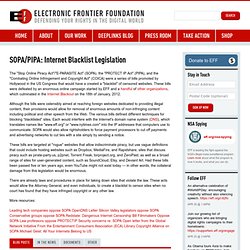

Electronic Frontier Foundation: The COICA Internet Censorship and Copyright Bill. The "Stop Online Piracy Act"/"E-PARASITE Act" (SOPA), the "PROTECT IP Act" (PIPA), and the "Combating Online Infringement and Copyright Act" (COICA) were a series of bills promoted by Hollywood in the US Congress that would have a created a "blacklist" of censored websites.

These bills were defeated by an enormous online campaign started by EFF and a handful of other organizations, which culminated in the Internet Blackout on the 18th of January, 2012. Although the bills were ostensibly aimed at reaching foreign websites dedicated to providing illegal content, their provisions would allow for removal of enormous amounts of non-infringing content including political and other speech from the Web. The various bills defined different techniques for blocking “blacklisted” sites. Each would interfere with the Internet's domain name system (DNS), which translates names like "www.eff.org" or "www.nytimes.com" into the IP addresses that computers use to communicate.
More resources: MasterCard’s Support for COICA Threatens A Free And Open Internet. In the last months of 2010, the WikiLeaks wars reminded transparency activists of something copyright and trademark lawyers know all too well – online speech is only as strong as the many service providers on which it depends.

All too often web hosts, domain name registrars and other service providers cave at the slightest legal or government pressure, with disastrous consequences for their users. We had hoped that credit card and other financial services would resist efforts to pressure them to stop processing payments to controversial websites. So we were dismayed to hear that not only does MasterCard support the passage of the Internet Censorship and Copyright Bill ("COICA"), but that it also appears to be signaling a willingness to voluntarily stop processing payments made to sites that allegedly offer “pirated” or other copyrighted content.
Of course, if COICA becomes law, the Justice Department would have the power to order MasterCard to stop processing payments to certain sites. La presse aura-t-elle l'interdiction pénale de publier des fuites ? Mise à jour : Selon les Echos (qui au passage disent avoir "eu accès" à un texte qui est en fait public depuis de nombreux mois), la proposition de Bernard Carayon devrait revenir sur le devant de la scène au printemps, avec la bénédiction du gouvernement. Le journal précise que c'est en fait la Délégation interministérielle à l'intelligence économique qui est à l'origine du texte. Article du 24 janvier 2011 - Plus de 130 députés UMP ont co-signé une proposition de loi déposée par le néo-godillot Bernard Carayon, qui vise à assurer la "protection des informations économiques" des entreprises. Le texte doit garantir la confidentialité de tout ce qui a une valeur économique pour les entreprises, mais qui ne relève ni du droit d'auteur, ni du droit des brevets, ni du secret de fabrication, ni du secret professionnel.
Accord commercial anti-contrefaçon. Un article de Wikipédia, l'encyclopédie libre. Pour les articles homonymes, voir ACAC. États-partie à la convention (signé et ratifié) Pays signataires Pays membres de l'U.E. signataires avec l'Union Pays membres de l'U.E. non signataires malgré l'Union Pays associé d'une autre manière Voir le traité sur Wikisource.
Berlusconi’s lackeys want to ban our books. They started from Venice. Let’s fight back! [English translation of the "call to arms" we issued yesterday.

We asked readers to fight back, and fighting they are! All the suggestions we gave at the end of this article are being enthusiastically put into practice, improved and shared by multitudes of people who are horrified by what is taking place in the Venice area. Publishers are making statements and releasing communiqués, the national media are starting to cover the affair, the National Association of Librarians (AIB) has strongly condemned the proposal and invited readers to counter any attempt at censoring and banning books. However, this isn't enough yet. We need people abroad to be aware of what's going on, there's a stench of nazi book burnings in Italy, and the case of fugitive "ex-terrorist" Cesare Battisti (now in Brazil) is nothing more than an excuse for repression.
The best words, given the circumstances, were found by our colleague Serge Quadruppani. Preliminary warning: the Battisti case here is just a pretext. ACTA. WikiLeaks Cables Shine Light on ACTA History.